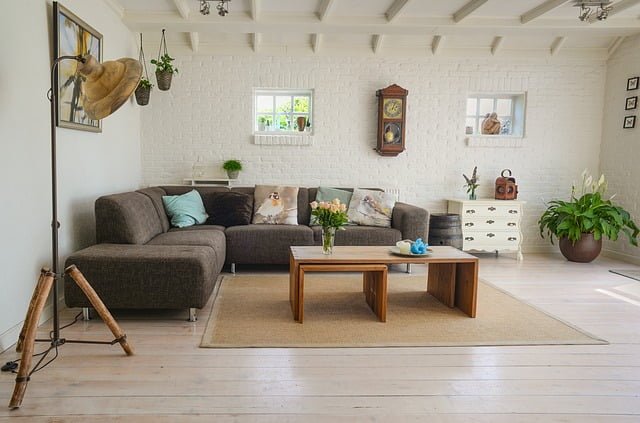
FDN LIFE >
COLIVING & COWORKING OR CONSIDERING IT?
TOP STRATEGIES FOR FDN COUPLES TO ORGANIZE WORK, LIVING & ‘EMOTIONAL’ SPACES TO KEEP THE BICKERING MONSTER AT BAY
GARDEN & HOME >
Working and living with a partner can be challenging. Even more, so is co-existing in a small space together or finding mutual ground when it comes to running your business. When you spend 24/7 working, living, and traveling with someone, you get the chance of getting to know them very well. Characteristics or behaviors you otherwise would only have noticed after a couple of years start to pop-up, and you now find you have to ‘share’ everything from your personal space to your ‘me time.’
Often, things either go well or south in a coliving, copartner working arrangement. However, things don’t have to be that way. The most successful coliving couples understand all about compromise, compassion, communication, and space optimization.
Organizing your working and living space together will help combat future bickering over nonsense and insignificances. Let’s get started:
LIVING ARRANGEMENTS

Style & Preferences
Find balance and tranquility in your partnership by ensuring the living areas you occupy incorporates both your styles, preferences, and possessions. Example: Learn to accommodate one another’s choice of possessions. If your partner loves an old couch, let them keep it instead of insisting on purchasing a brand new one.
Respect Your Partners Perspective
Respect one another’s perspective on how they want to live or arrange a specific area in your living space. Successful partnerships require two people who can set aside their differences to find a solution that works for both. Alternatively, a way that is most conducive to the growth of the relationship. Most often, mutual compromise is needed.
Dealing with Clutter & Messines
You and your partner will have to come to an agreement or compromise when living together in a small space. Clutter and who is responsible for cleaning what or when are often grounds for frequent bickering and fights.
Before even considering working and living together, sit down and have a chat about your expectations when it comes to clutter and what you regard as ‘messy.’
Each person’s perspective on what clutter and messiness is-is different. You might think doing the dishes every 3rd day is not messy, while your partner feels the kitchen should be clean at all times.
Talk about what no-go areas for both of you are when it comes to clutter and messiness.
Cleaning
Sooner or later, you will be fighting about who is cleaning the house and when. Especially in cultures where roles for men and woman are still gender-specific. Cross-cultural FDN couples can be more prone to fighting about gender-specific insistences, especially when it comes to cleaning, grooming, food preparation, and dress code.
Examples:
Partner 1: “I don’t clean toilets. That is not my job.”
Partner 2: “So you are saying it’s my job? You are also using the toilet; why should I clean after you?”
Or:
Partner 1: “I always clean the house. You rarely help.”
Partner 2: “I do help you. Look! I mopped the kitchen floor.”
Partner 1: “That is only one thing you helped with while in the same time it took you to clean the floor I already cleaned the bedroom, bathroom, office and living room.”
Bickering such as the above is common. Cleaning responsibilities are the duty of both partners. You are in it together when you decided on coliving and working.
Come to an agreement on when you will clean your space together, and the role and duties each partner has to fulfill.
Top Tip: If you have tried everything and nothing works, consider hiring weekly cleaning services. (Both partners should contribute to paying for cleaning services.)
Respect One Another’s Privacy
Give each other space. Both of you need to feel welcome and that you belong in your home. Some partners enjoy solitude more than others. If your partner is an introvert, allow them their time of peace and quiet.
Respect A Partners Social Preferences
If your partner is an extrovert and love to go out, but you are an introvert, know that you will also need to compromise and accommodate your partners desire for social interaction.
Talk About Annoying Behavior & Actions
Pay attention when a partner becomes annoyed and irritated at a particular activity or behavior. No partnership is perfect, but neither is you or your partner. Irritation and annoyance is a part of life. It is of no use to get overly emotional or to victimize yourself if your partner points the finger. You are both going to make mistakes or do things that the other find annoying. The key is to talk about what is bothersome to you both and find a solution that works.
Example: Does one partner always close a door loudly when you are sleeping? Address your annoyance at this behavior and ask them to close the door softly instead.
Many people don’t change their behavior, but people can be more considerate and accommodating. Therefore, find a way to be more accommodating and thoughtful towards a partner.
Storage Space
Another point to look at is storage in a small space of which there is never really enough, to begin with. Finding creative ways to store your stuff, or perhaps opting for a more minimalist lifestyle will be beneficial to the partnership in the long run.
Lifestyle Expenditure
Money is a topic most partners disagree on. Before moving in together, talk about what type of things you want to spend on for your living space. Example: Décor, art, curtains, bedding, weekly grocery shopping, etc.
It is also essential to talk about your weekly and monthly budget for living costs. Come to an agreement and put together a list of things both partners feel necessary to purchase.
Top Tip: Both partners should be contributing to living costs. Or if running a business together, use your shared funds for living expenses, décor, home improvements, home repairs, etc.
LIVING SPACE ARRANGEMENT OPTIONS:

The Bedroom: Since couples spend much time together, it will become imperative to separate work-spaces from living spaces. Your bedroom should be an area where you and your partner can relax, sleep, and enjoy intimate time together. A study by the Division of Sleep Medicine at Harvard found that sleep improves if we keep work, computers, and TV’s out of the bedroom. Don’t work in your bedroom or bring work into the bedroom. Furthermore, keep electronics and TVs in the living room. The psychological effect and later emotional effects of work vs. office space can influence us negatively as human beings. Its best to keep living and working areas separate, especially if living and working with a partner.
- Work Area: Setup an area in your home dedicated to working. This can be a second bedroom that you can turn into an office, or, if that is not possible, set up a workspace somewhere in your home.
- Living Room: It’s best NOT to have the living room close to your workspace since one partner might be watching something on the TV in the living room while you’re trying to work. Consider keeping your living room and workspace separate. As with bedrooms, you’ll find your productivity dwindling if working in front of the TV or when sat on a comfy couch. Keep work-related tasks to be done only in your workspace.
- Kitchen: Don’t fall into the trap of purchasing a large selection of kitchen gadgets and equipment when you start living together. Sit together and plan what you need for your kitchen.
Keep things simple yet practical with well-organized storage shelves for your spices, groceries, and cooking equipment. Multi-purpose equipment such as a blender that can also make juice works well in small kitchens, while a coffee machine is not all that practical if you can get by with making your coffee inexpensively from boiling some water in a kettle.
Top Tips: We have found setting up our kitchen with only the stuff we need, works best. The rest gathers dust. Invest in quality multi-purpose items.
LIST OF ITEMS FOR NEWBIE FDN COUPLES MOVING IN TOGETHER
Our list of items below is ideal for couples just moving in together or considering it.

Top Tip: Keep your work and living spaces minimalistic, especially when just starting. There is no need to purchase everything at once. Furthermore, place everything that both of you own on a list (or go through your individual kitchens if still living separately). Check if the needed item(s) on your list is not already owned by one of the partners. As such, you don’t waste money purchasing another of the same item.
Possible Kitchen Items & Equipment
Consider the usual items, such as:
- Knives
- Forks
- Teaspoons
- Tablespoons
- Large wooden cooking spoon
- Spatula
- Mugs
- Plates
- Bowls
- A pot or two
- Frying pan
- Stovetop/induction cooker
- Pressure Cooker
- Multi-purpose sandwich-toaster-barbeque maker
- Kettle
- All-in-one blender/juicer
- Freshwater dispenser/filtration system
- Fridge
- Proper storage shelves
- Cutting board
- Sharp knives for cutting and food preparation.
Supplies:
- Dish washing liquid
- Washcloth/sponge
- Drying cloth
- Washing rack to dry dishes, etc.
- Broom
- Mop
Starter Groceries:
- Salt
- Spices as per your choice
- Staples such as pasta, rice, wheat flour.
- Honey (or sugar)
- Tea & coffee
- Milk
- Vegetables for the week such as potatoes, carrots, cauliflower, peas.
- Fruits for the week such as berries, bananas, apples, etc.
- Cooking oil
- Healthy snacks for the week.
Top Tip: Don’t buy too large quantities of fruits and vegetables that can wither quickly. Buy 2-3 pieces of the vegetables and fruits that you both love most, to start with. You’ll soon realize which vegetables you need more of as you settle in.
WORKING ARRANGEMENTS

Organizing your workspace can be a lot of fun. However, before anything else, decide if you would be sharing a work (office) space or if each person will have their own working area.
Whatever you decide, there are several non-negotiables when it comes to creating a productive work environment. These are:
- Desk / Table
Each of you should have a good table or surface to work on, separately or together.
- Comfortable Chairs
No one enjoys working in discomfort. Choose a chair that would be most conducive to sitting for long hours, such as a mesh chair that provides lumbar support.
- Stationery & Electronics
Some love stationary and manually writing things down, while others prefer doing everything online.
Whichever manner your partner prefers, respect that, but do find a practical way you could both work together most efficiently and effectively, when it comes to working together its best to focus on each partner’s talents and strongest abilities.
Stationary such as pens, paper, notebook(s), scissors, pencils, and a ruler often come in handy.
Electronics such as plugs, cords, chargers, and the like are also important. Keep things neat, organized, and tidy. Have a shelf or cupboard handy to store stationery, business files, documents, or electronics you don’t use every day.
CLUTTER IN THE WORK ENVIRONMENT
Some work well on a messy desk; others don’t. Clutter in the work environment can become a distraction and annoyance to a partner who hates it.
Consider keeping your work areas tidy and neat if you are sharing a table. If things don’t work out, let each partner have their own table that they can arrange as they desire.
Some Tips To Decluttering Your Workspace:
- Use boxes or containers to organize and put away excess stationery or electronics.
- Label boxes and containers, so you know where to look when you need something instead of having to go through every box to find a new highlighter.
- Working from home every day can become a bore. Switch things up by going to a local coffee shop, a tea garden, or even, hiking up a nearby mountain with your portable WIFI dongle and work from there for the day.
- Your laptop or desktop is also part of your workspace. Clean up your screen if there are too many icons, especially the ones you don’t use.
- Have a backup drive installed just in case your computer gets busted or something.
- Place your goals, vision, mission, and some inspirational quotes on a vision board close to your work table(s) where you both can see it. This help with motivation and focus on what you need to do every day.
OTHER CONSIDERATIONS
Respect Your Partners Work Time
If you prefer sleeping in-in the mornings while your partner is an early riser, respect their preference(s). Some people are most active and alert in the morning, while others prefer working in the afternoon, evening, or early morning hours. Let a partner choose when they work.
Work Hours
Apart from money, a lot of bickering occurs because one partner might feel they are putting in more hours (or effort) compared to the other partner. This is tricky ground, with tempers and egos flaring up in all directions if the situation is not handled with care. If you are considering working and living together, sort out the number of work hours needed per partner-per day, from the get-go. If you are already in this type of situation, it’s time for a ‘business meeting’ to sort it out.
Making a life together is not only about the space, but about learning and growing together. Invest time, patience, and consideration in your relationship. The best relationships are built over time and with effort from both partners. However, it’s all worth it.
Have fun!
HOW DO YOU ORGANIZE YOUR LIVING AND WORK SPACE?
We could love to hear how you as a couple organize your living and working spaces. Let us know your thoughts and strategies in the comments below.
SUBSCRIBE TO
FDN LIFE NEWSLETTER!
Join our mailing list to receive the latest news, information, and special offers.


